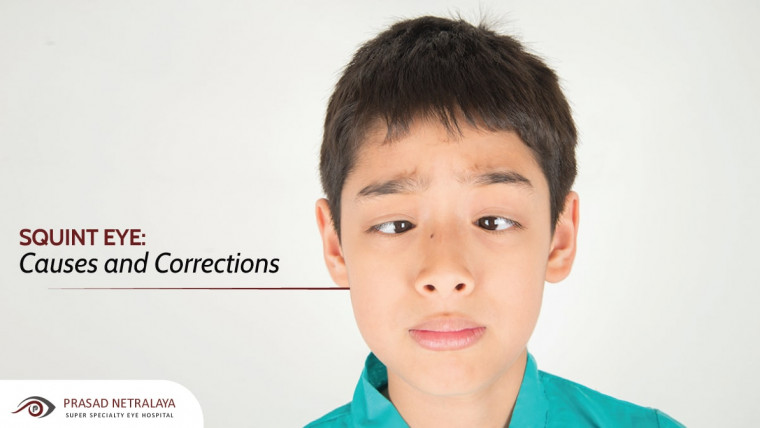A child’s vision development begins even before birth, and several factors can affect their vision, resulting in severe eye conditions and diseases. One of the most common eye problems is squint eyes and parents are often troubled with questions like ‘does squint eyes affect the vision?’, ‘can squint eyes be corrected?’, etc. In this blog, we will bust some common myths associated with squint eyes to help you avail the right care and cure the condition with minimal problems.
Table of Contents
What is Squint Eye?
Squint is a visual disorder that happens when the eyes point in a different direction. Medically termed Strabismus, Squint is a failure condition of the two eyes to maintain a proper alignment. Even though it is mostly diagnosed in young children, it can develop at any age. Individuals with squint will have one of their eyes turn in (Converge – Esotropia), turn out (diverge- exotropia), or even sometimes turn up (hypertropia) or down (hypotropia).
However, there are several myths and misconceptions associated with the condition. Scroll on to discover the facts about squint.
1. Squints Are Congenital
Contrary to this popular myth, squints are not only restricted to children. They can happen at any stage due to various reasons. But how does squint eye occur? It is due to improper balance of the muscles involved in central mechanisms or the mechanical restriction of eye movements.
If the condition is suspected at birth, it is important to evaluate the infant at the earliest for better vision development. The principal causes of the condition are –
- Congenital (by birth)
Infants born with a squint may not be seen in the initial few weeks. However, the condition will develop within six months after birth.
- Childhood Illnesses
The condition might occur in children due to their medical history of viral fever, measles, meningitis, myopia, astigmatism, and more.
- Nerve Palsy
Injury or nerve damage will initiate the onset of Squint at once or over time.
- Hereditary (Genetic)
Is squint eyes genetic? Yes, children with a family history of frequent squints will increase their probability of developing the same disorder.
2. Squinting Is Only A Cosmetic Problem
Does squinting eyes affect vision? Yes, but most people believe that squint is only an aesthetic issue and does not affect eye health. However, contrary to popular belief, squinted eyes do affect vision. Even though it can affect self-confidence in children, treatment is not just for cosmetic and mental health reasons. It is essential to prevent the onset of various eye problems.
When the child with squint cannot focus well, he/she has to put in extra effort, leading to double vision. If it is left unnoticed, the eye will deviate and can cause Amblyopia (lazy eye) and even vision loss. Poor adaptation by the sensory mechanisms will affect the higher degrees of binocular vision and can result in double vision.
Related: Strabismus (Squint Eye) vs Amblyopia (Lazy Eye): Know the Difference!
3. Squint Has No Ideal Treatment
Can Squint Eyes be corrected? Yes. However, it is sometimes said that there are no options for squint correction. It is a myth since it can be rectified. Proper evaluation and customised intervention are essential to prevent the permanent occurrence of visual dysfunction caused by squint, including diminished depth perception and a lazy eye.
An ophthalmologist might suggest some non-invasive treatment options, including –
- Glasses Or Contact lenses
Refractive errors like myopia, astigmatism, and hypermetropia will be corrected using glasses or contact lenses to improve vision and reduce stimulus.
- Eye Exercises
Eye exercises will strengthen the eye muscles to gain better control over movements.
- Medications
Getting Botulinum toxin injections into the eye muscles will temporarily weaken some eye muscles, allowing them to focus on better realignment.
- Prism Therapy
Prisms incorporated in spectacles improve eyes’ appearance and facilitate alleviating misalignment difficulties.
- Patching The Eye
It is to treat the lazy eye to improve vision and might help control eye movements’ misalignment.
Read more: 5 Common Vision Problems That Come With Aging
4. Squint Surgery Is Risky
Is squint surgery safe? Totally. Squint surgery is often considered a high-risk procedure, but it is one of the most common and safe treatments. During the process, the ophthalmologist will loosen, tighten or reposition the eye muscles on one or both eyes to restore the proper alignment of eye movement. In general, squint operation costs along with management may vary depending on the individual’s condition.
5. Squint Eyes Goes Away On Its Own
One of the most persistent myths about squint is that it will naturally disappear over time without any treatment. However, this is not the case. If your child is developing the condition, it is important to make an appointment with the best eye specialist in Mangalore as early as possible.
The Bottom Line
Remember, early detection of vision problems will get you timely and proper medical attention. Prasad Netralaya Eye Hospital, the best eye hospital in Karnataka, ensures to evaluate your condition completely and then provides you with a comprehensive treatment plan for squint, restoring your perfect vision.
Don’t let poor vision affect the quality of your life. Book your appointment with us to keep track of your visual needs.
Dr. Vikram Jain, M.S. had his medical training (MBBS) from Kasturba Medical College, Mangalore, India. He did his master’s in Ophthalmic surgery from Kasturba Medical College, Manipal. He currently manages the Glaucoma department of Prasad Netralaya hospital.


